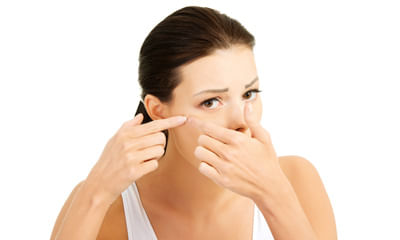Do's And Dont's For Acne And Pimples!
Acne is a term used to define a broader category of conditions than pimples. The term is used to define skin diseases that involve sebum, keratinisation and bacteria. The condition varies from very mild acne to severe acne, which usually involves the cystic variety of the condition.
As for the percentage of the population affected by acne, this is invariably the most common skin condition that you can suffer from (95% of all people will suffer from this condition at some point of their lives). It is also the most stubborn skin condition in some cases.
Let’s take a look at some do’s and don’ts for an acne prone skin.
Here’s what not to do when you have acne:
1. Over washing – dirt and oil are not the only reasons for your acne it is multifactorial so excessive washing and cleaning will not only make your skin dry and dull but it also alters the ph of the skin and will make it more prone to breakouts.
2. Picking and squeezing – touching your face and specifically the areas affected will expose it to more bacteria, and more bacterial exposure can never be good for acne.
3. Over the counter products – using products indiscriminately can play havoc on your skin. Make sure you consult a good dermatologist to find the right products for you.
4. Avoiding moisturizer and sunscreen – avoiding moisturizer and sunscreen is a common habit amongst people suffering from acne which in turn leads to excessive dryness making skin more prone to tanning and acne marks. Consulting your dermatologist will help you find a suitable moisturizer and sunscreen for acne prone skin.
Some home remedies to try:
1. Apple cider vinegar
Apple cider vinegar is a powerful antibacterial that alkalises itself, not only that, it is also an astringent that dries up excess oil and makes it difficult for the bacteria to thrive.
How to use: take pure, unfiltered apple cider vinegar and mix one part with three parts water, take the mix on a cotton swab and apply it on the acne/blemish for 10 minutes once in the night daily.
2. Cinnamon and honey mask
Honey is a natural antibiotic and so is cinnamon and both these ingredients when mixed together, have a synergistic effect that helps you control breakouts.
How to use: mix 2 tablespoon of honey and 1 teaspoon of cinnamon to make a paste and apply on the affected area for 15 minutes.
3. Orange peel paste
Vitamin c is a natural astringent, apart from being that, it also helps in new cell growth and repair and maintenance.
How to use: take two orange peels and mash them in a grinder and make sure you make a thick paste, and apply it on your face for 20-25 minutes.
4. Banana peels
Banana peels contain a substance known as lutein, and this is an extremely powerful antioxidant that reduces swelling and inflammation.
How to use: make a banana peel and rub the inside of it in circular motions on the affected areas. Let it sit for 30 minutes or so and then wash.
Do you have acne that does not respond to treatment? have you tried everything and failed? or do you just want to do the smart thing and get professional help to nip the disease in the bud?



+1.svg)
